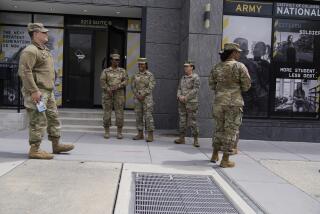Send Out an SOS on Iraq
- Share via
As he geared up for the 1996 reelection campaign, President Clinton promised that the U.S. troops he would dispatch to Bosnia as peacekeepers would stay for only one year. Seven years later, nearly 2,000 remain.
As he readied for war, President Bush said the United States would “remain in Iraq as long as necessary, and not a day more.” Nearly 150,000 U.S. troops now patrol Iraq, with administration officials steadfastly refusing to estimate how many will be required for how many years. Though it may be politically smart to avoid making promises it can’t keep, the administration owes the nation a better sense of what kind of U.S. budget and troop commitments will be required.
Sens. Richard G. Lugar (R-Ind.) and Joseph R. Biden Jr. (D-Del.) returned from a quick trip to Iraq and predicted this week that U.S. forces would remain in Iraq for at least five years. Given the continued attacks on U.S. and British forces there, that’s a reasonable estimate. Gen. John P. Abizaid, who is about to become commander of those forces, said Wednesday that “a large number” of troops would be required in Iraq “for the foreseeable future.”
The administration also should estimate the costs of different troop levels and the price tag of overall U.S. support for rebuilding that nation.
Getting out of Iraq too early could cause chaos, with different groups battling for power and other nations and elements eagerly trying to exert influence. Lugar and Biden made the sensible suggestion that Washington ask for troops from the North Atlantic Treaty Organization. The administration also should seek help from the United Nations, which can provide nonmilitary assistance like crop irrigation, vocational schools and medical clinics.
The Pentagon said last week that more countries had agreed to send peacekeeping troops to Iraq, which would provide tangible evidence of a multilateral role. But most nations would have a token presence, and Washington would pick up the bill.
Not all nations are too poor to contribute; some may just be waiting to be asked or to enter Iraq under U.N. auspices. Each week brings more evidence -- blackouts due to looted electrical plants, Iraqi soldiers rioting for back pay, abandonment of plans for a national conference on the country’s political future -- that the administration was woefully unprepared for the task of running Iraq after toppling Saddam Hussein’s regime. The United States needs to send an SOS to other nations before the situation gets worse.
More to Read
Get the L.A. Times Politics newsletter
Deeply reported insights into legislation, politics and policy from Sacramento, Washington and beyond. In your inbox twice per week.
You may occasionally receive promotional content from the Los Angeles Times.










